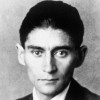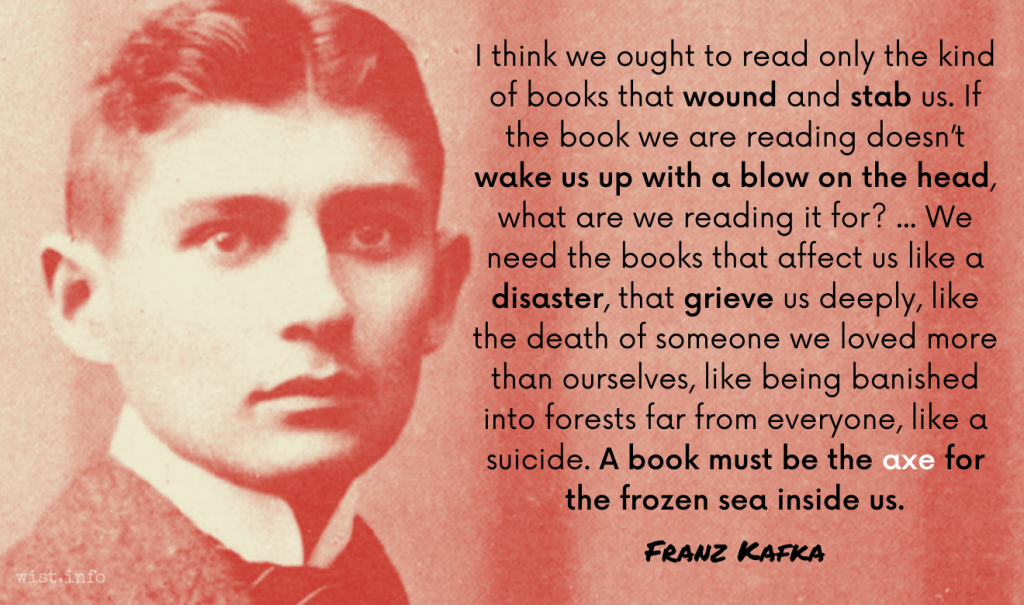Quotations by:
Kafka, Franz
The true way is along a rope that is not spanned high in the air, but only just above the ground. It seems intended more to cause stumbling than to be walked upon.
[Der wahre Weg geht über ein Seil, das nicht in der Höhe gespannt ist, sondern knapp über dem Boden. Es scheint mehr bestimmt stolpern zu machen, als begangen zu werden.]
Franz Kafka (1883-1924) Czech-Austrian Jewish writer
Notebook, Aphorism #1 [tr. Kaiser and Wilkins]
(Source)
They’re talking about things of which they don’t have the slightest understanding, anyway. It’s only because of their stupidity that they’re able to be so sure of themselves.
Franz Kafka (1883-1924) Czech-Austrian Jewish writer
The Trial, ch. 1 (1925) [tr. Wyllie (2003)]
(Source)
The protagonist Josef K., musing over the minor functionaries who have arrested him on unknown charges.
As the flood spreads wider and wider, the water becomes shallower and dirtier. The Revolution evaporates, leaving behind only the slime of a new bureaucracy. The chains of tormented mankind are made out of red tape.
Youth is full of sunshine and life. Youth is happy, because it has the ability to see beauty. When this ability is lost, wretched old age begins, decay, unhappiness. […] Anyone who keeps the ability to see beauty never grows old.
History is made out of the failures and heroism of each insignificant moment. If one throws a stone into a river, it produces a succession of ripples. But most men live without being conscious of a responsibility which extends beyond themselves. And that — I think — is the root of our misery.
I think we ought to read only the kind of books that wound and stab us. If the book we are reading doesn’t wake us up with a blow on the head, what are we reading it for? So that it will make us happy, as you write? Good Lord, we would be happy precisely if we had no books, and the kind of books that make us happy are the kind we could write ourselves if we had to. But we need the books that affect us like a disaster, that grieve us deeply, like the death of someone we loved more than ourselves, like being banished into forests far from everyone, like a suicide. A book must be the axe for the frozen sea inside us. That is my belief.
[Ich glaube, man sollte überhaupt nur solche Bücher lesen, die einen beißen und stechen. Wenn das Buch, das wir lesen, uns nicht mit einem Faustschlag auf den Schädel weckt, wozu lesen wir dann das Buch? Damit es uns glücklich macht, wie Du schreibst? Mein Gott, glücklich wären wir eben auch, wenn wir keine Bücher hätten, und solche Bücher, die uns glücklich machen, könnten wir zur Not selber schreiben. Wir brauchen aber die Bücher, die auf uns wirken wie ein Unglück, das uns sehr schmerzt, wie der Tod eines, den wir lieber hatten als uns, wie wenn wir in Wälder verstoßen würden, von allen Menschen weg, wie ein Selbstmord, ein Buch muß die Axt sein für das gefrorene Meer in uns. Das glaube ich.]
Franz Kafka (1883-1924) Czech-Austrian Jewish writer
Letter to Oskar Pollak (1904-01-27) [tr. Winston (1977)]
(Source)
This passage (in translation) is frequently only partially quote, particularly the final "ice axe" line, making parallel translations difficult. I have tried to give as full quotations as I could find.
(Source (German)). Alternate translations:
Altogether, I think we ought to read only books that bite and sting us. If the book we are reading doesn't shake us awake like a blow to the skull, why botehr reading it in the first place? So that it can make us happy, as you put it? Good God, we'd be just as happy if we had no books at all; books that make us happy we could, in a pinch, also write ourselves. What we need are books that hit us like a most painful misfortune, like the death of someone we loved more than we love ourselves, that make us feel as though we had been banished to the woods, far from any human presence, like a suicide. A book must be the ax for the frozen sea within us. That is what I believe.
[tr. Pawel (1984)]
If the book we are reading does not wake us, as with a fist hammering on our skulls, then why do we read it? Good God, we also would be happy if we had no books and such books that make us happy we could, if need be, write ourselves. What we must have are those books that come on us like ill fortune, like the death of one we love better than ourselves, like suicide. A book must be an ice axe to break the sea frozen inside us.
[E.g. (1987)]
The books we need are the kind that act upon us like a misfortune, that make us suffer like the death of someone we love more than ourselves, that make us feel as though we were no the verge of suicide, or losrt in a forest remote from all human habitation -- a book should serve as the ax for the frozen sea within us.
[tr. Rahv (1952)]
A book should be an ice-axe to break the frozen sea within us.
[E.g.]
A book must be an ice-axe to break the seas frozen inside our soul.
[E.g.]
All human errors are impatience, the premature breaking off of what is methodical, an apparent fencing in of the apparent thing.
[Alle menschlichen Fehler sind Ungeduld, ein vorzeitiges Abbrechen des Methodischen, ein scheinbares Einpfählen der scheinbaren Sache.]
Franz Kafka (1883-1924) Czech-Austrian Jewish writer
Notebook, Aphorism #2 [tr. Kaiser and Wilkins]
(Source)
Alt. trans.: "All human errors are impatience, a premature breaking off of methodical procedure, an apparent fencing-in of what is apparently at issue."
There are two main human sins from which all the others derive: impatience and indolence. It was because of impatience that they were expelled from Paradise; it is because of indolence that they do not return. Yet perhaps there is only one major sin: impatience. Because of impatience they were expelled, because of impatience they do not return.
[Es gibt zwei menschliche Hauptsünden, aus welchen sich alle andern ableiten: Ungeduld und Lässigkeit. Wegen der Ungeduld sind sie aus dem Paradiese vertrieben worden, wegen der Lässigkeit kehren sie nicht zurück. Vielleicht aber gibt es nur eine Hauptsünde: die Ungeduld. Wegen der Ungeduld sind sie vertrieben worden, wegen der Ungeduld kehren sie nicht zurück.]
Franz Kafka (1883-1924) Czech-Austrian Jewish writer
Notebook, Aphorism #3 (20 Oct 1917) [tr. Kaiser and Wilkins]
In The Blue Octavo Notebooks (1954) and in Dearest Father: Stories and Other Writings (1954); variant translations use "cardinal sins" instead of "main human sins" and "laziness" instead of "indolence", e.g., "There are two cardinal sins from which all others spring: impatience and laziness."
Beyond a certain point there is no return. This point has to be reached.
[Von einem gewissen Punkt an gibt es keine Rückkehr mehr. Dieser Punkt ist zu erreichen.]
Franz Kafka (1883-1924) Czech-Austrian Jewish writer
Notebook, Aphorism #5 [tr. Kaiser and Wilkins]
(Source)
Alt. trans.:
- From a certain point onward there is no longer any turning back. That is the point that must be reached.
- There is a point of no return. This point has to be reached.
Man cannot live without a permanent trust in something indestructible in himself, though both the indestructible element and the trust may remain permanently hidden from him. One of the ways in which this hiddenness can express itself is through faith in a personal god.
[Der Mensch kann nicht leben ohne ein dauerndes Vertrauen zu etwas Unzerstörbarem in sich, wobei sowohl das Unzerstörbare als auch das Vertrauen ihm dauernd verborgen bleiben können. Eine der Ausdrucksmöglichkeiten dieses Verborgen-Bleibens ist der Glaube an einen persönlichen Gott.]
Alt. trans.:
- “Man cannot live without an enduring faith in something indestructible within him.” [In Max Brod, introduction to Gustav Janouch, Conversations with Kafka (1953) [tr. Rees]]
- “Man cannot live long without a steady faith in something indestructible within him, though both faith and the indestructible thing may remain permanently concealed from him.”
Franz Kafka (1883-1924) Czech-Austrian Jewish writer
Notebook, Aphorism #50 [tr. Kaiser and Wilkins]
Alt. trans.:
- "Man cannot live without an enduring faith in something indestructible within him." [In Max Brod, introduction to Gustav Janouch, Conversations with Kafka (1953) [tr. Rees]]
- "Man cannot live long without a steady faith in something indestructible within him, though both faith and the indestructible thing may remain permanently concealed from him."


